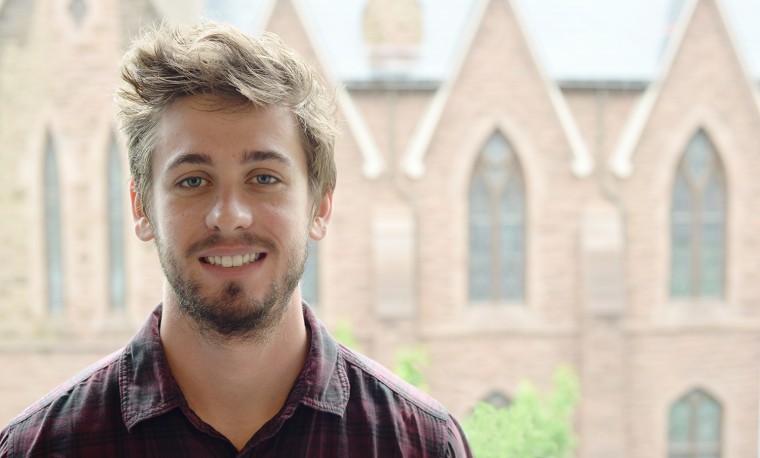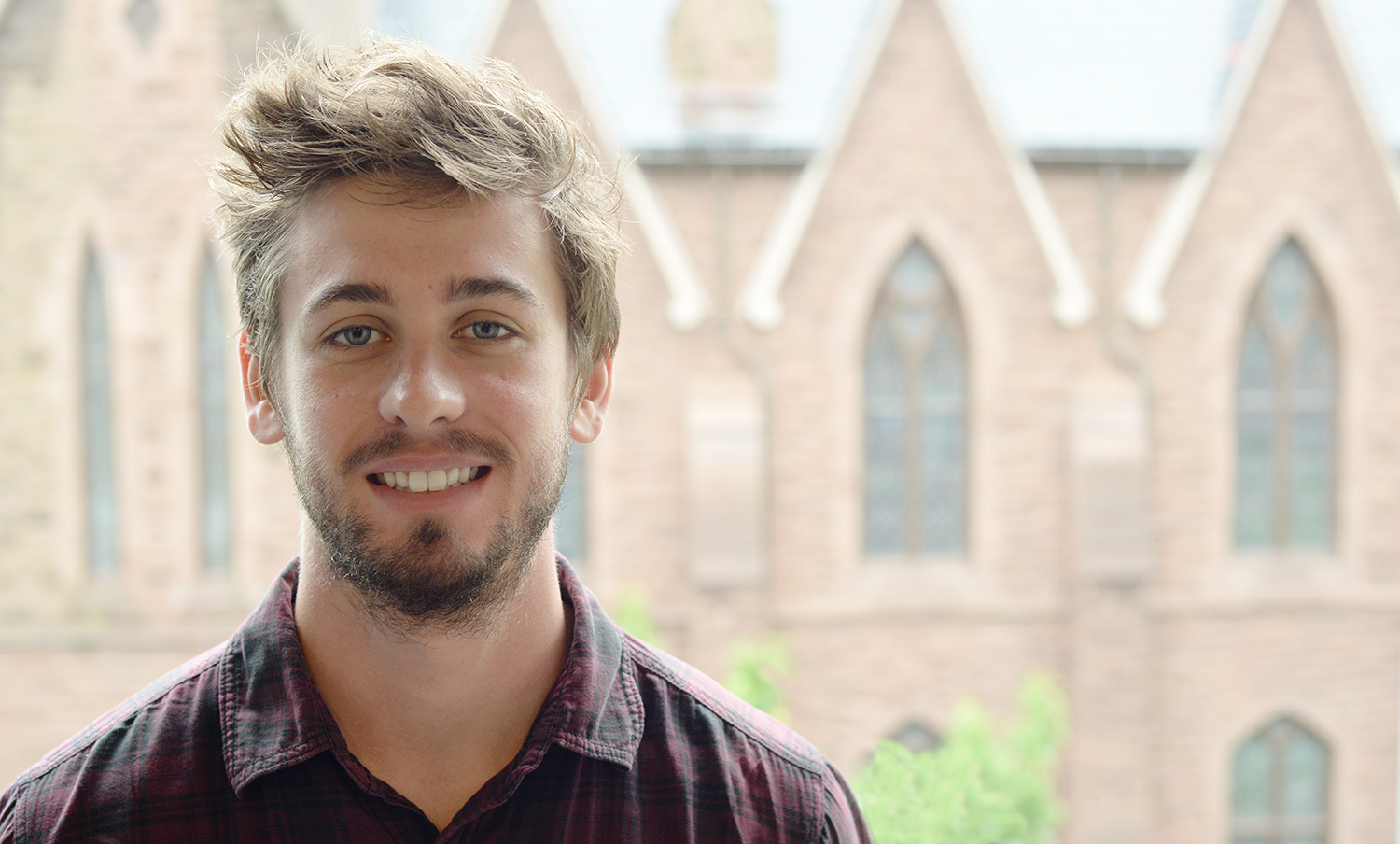Rice ’17 Studies Philosophy, Film and Music in Copenhagen


In this News @ Wesleyan story, we speak with Ian Rice from the Class of 2017.
Q: Ian, where are you from and what is your major?
A: I’m from Boise, Idaho and I’m double majoring in physics and film as well as getting a Writing Certificate.
Q: Why did you decide to study abroad in Copenhagen through the Danish Institute for Study Abroad (DIS) in Spring 2015?
A: I was very interested in Scandinavian culture, partially due to the modern portrayal of Scandinavia as a haven of progressiveness and equality as well as the incredibly high standard of living. I wanted to see what it was really like and if it would live up to its reputation. In many ways it did, but it’s definitely not perfect. I actually came to appreciate certain things about America that I had taken for granted or even resented a little bit. Going to a country of five and a half million people where the focus is on close friends and living a life of contentment as opposed to a life where one strives for “greatness” helped me put the grandeur and scale of America in context.
I also chose Scandinavia because I have ancestry in Sweden and wanted to connect with that a little bit. On top of all that, DIS seemed like an incredibly well-run program with many appealing aspects such as the study tours incorporated with classes, the various living options, and a wide selection of courses taught in English. And, as it turned out, it was a fantastic program.
Q: Please tell us about your studies in Copenhagen. What was the most meaningful part of your experience abroad?
A: The most meaningful part of my experience abroad ended up being somewhat surprising. I took two classes on the Danish philosopher Søren Kierkegaard at the University of Copenhagen. One of these was a seminar, which involved meeting once a week with five other students to discuss the book Fear and Trembling. All of the members of the seminar class got really close and we had some of the best conversations I’ve ever had in any class. I also ended up really connecting with Kierkegaard’s absurd, soul-searching take on life and the existential themes of his writing ended up being a kind of framing for all of the varied experiences involved in studying in a foreign country.
It was also amazing studying Kierkegaard at the very university he attended and wandering the city where he wrote the things we were reading. I was surprised by how much the tangible connection to the person brought life to the things we were reading. It was strange visiting his grave in central Copenhagen at the end of my stay and really connecting with the fact that he had been a real person. Reading so much of his work made me feel almost like I really knew him and I’ll always have a special connection to him and his philosophy.
Q: I understand your study abroad experience included a “Vienna: Capital of Classical Music” study tour. Please tell us about that.
A: DIS offers small classes with light course loads with study tour components. I took “Vienna: Capital of Classical Music” to get the chance to get a better overview of classical music. It ended up being one of the best decisions I made during study abroad. The study tours at DIS were fantastic in general. I went to both St. Petersburg for a literature course and Vienna for a music course. Both tours were incredible and I’m amazed at the organization involved on DIS’s part sending thousands of Americans all over Europe.
We did so many great things in Vienna including touring the Secession Museum, eating at the café where Freud would hang out, and seeing the Vienna State Opera as well as the Vienna Symphony. Many of the students I went on the tour with were very accomplished musicians and I learned so much just talking to them; their knowledge helped me to better appreciate the performances we were seeing. They were keyed in on things I never would have noticed like the interplay between different instrument sections and the fact that the first violin was playing a bit like a diva. As far as classical music goes, there couldn’t have been a better introduction than Vienna. Seeing the symphony play Berlioz’s Symphonie Fantastique at the Musikverein was one of the highlights of my entire time abroad. Studying abroad in general and doing things like touring Mozart’s apartment made many things in my life that seemed almost mythical feel more real.
I also fell completely in love with the city. It was like Paris, but cleaner and more German. It made me want to live there. Now I just have to learn German.
Q: Congratulations on winning a DIS European Humanities Academic Excellence Award for the Spring 2015 semester! In nominating you for the award, your professors noted your “rare analytical, critical and creative talent,” and said you are “passionately interested in cinema, literature and philosophy.” How have you developed these interests during your time at Wesleyan?
A: The film program is the reason I ended up deciding to come to Wesleyan and I can’t speak highly enough about the department. One of the best things about Wesleyan is the students and I’ve learned so much about film from casual conversation with other students. I feel like film is an inescapable part of Wesleyan’s social fabric. Whether you experience it on a casual basis at the film series or you work on the crew of a senior thesis film, cinema touches every Wesleyan student’s life in some way before they leave.
I had a great time working on a few of the senior theses last year and plan on doing so again in the fall. I’m very excited for the things to come in terms of film at Wes. I just joined the film board and as a junior this is my first year officially as a major.
My experience with literature and writing at Wesleyan has been equally great. Before coming to Wesleyan I had never had a chance to work on creative writing in an academic setting and taking Anne Greene’s writing class as a freshman definitely opened up a whole new world to me. The class introduced me to the art of creative essay writing and the things I learned in that medium have transferred to all of my writing.
I haven’t had a chance to study philosophy at Wesleyan with my schedule, but I hope to take a few classes before I graduate.
Q: Do you have any plans to return to Denmark or Europe in the future?
A: I definitely hope to return to Denmark and Scandinavia in the future. I didn’t really get a chance to see much of Norway or Sweden and would even consider living and working in northern Europe. The lifestyle focused on small scale, everyday contentment really appealed to me and I would love to live in a place where college is free and I can get paid paternity leave for up to eight months. I could even see myself returning to DIS for an internship, helping to run film classes and events.
Q: What are you involved in at Wesleyan outside of the classroom?
A: At Wesleyan I’m a member of the Film Board, I had a radio show, I play recreational soccer, I did an internship with WILD Wes, I’m a writing mentor and I was the house manager of the Bayit first semester sophomore year before I went abroad.
Q: What would you like to do after graduation?
A: I want to work in film, but I’m not sure I want to work on production. I could see myself working for a distribution company like Criterion or even being involved in film academics.

